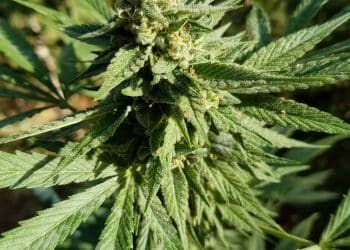The marriage of cannabinoids with medicinal mushrooms draws dowries of therapeutic benefits from both parties. Joined together in union, these diamonds from the plant and fungi kingdoms empower one another with vows of synergy. Cannabis-and-fungi power couples present unique blends with potent effects, and product designers now arrange their matrimony.
Practically, it can be anything: from a psilocybin chocolate bar to a complex solution for micro dosing application.
Beneficial compounds in mushrooms include polysaccharides, phenolic antioxidants, peptides, and lipids. Healing properties are too expansive to list here, ranging from from anti-inflammation to improved digestion. Mushrooms also pack triterpenes; as one example, the triterpene betulin from chaga promotes wound healing. Some varieties, such as Psilocybe cubensis, carry psychedelic chemicals with the potential for extraordinary psychological healing.
Cannabis brings hundreds of medicinal molecules to the table, most prominently cannabinoids and terpenes. The phytochemicals in cannabis work together to boost therapeutic outcomes, which is known as the entourage effect. It stands to reason, then, that other plant/fungi chemicals work together in a similar fashion. This philosophy guides the combination of cannabis and mushroom ingredients for targeted purposes.
Products often feature lion’s mane, chaga, and reishi; research has shown that each of these mushrooms boosts cognition and brain health. [1-3] Buddha Teas, for example, combines these three with cannabidiol (CBD) in lemongrass and rooibos tea. CBD promotes neurogenesis and neuroplasticity; it can attenuate anxiety and depression. [4] It may increase blood flow to the hippocampus and improve memory. Coffee infusions with mushrooms and CBD have therefore also made a splash, combining the power of these brain-boosting nutraceuticals with coffee beans. HempWorks infuses coffee with CBD and chaga.
Marriages may include other cannabinoids (i.e., polygamy); one example is 7 Wonders Mushrooms by The Light Hearted Farmer, which combines CBD and cannabigerol (CBG) with the aforementioned shroom stars as well as turkey tail and shiitake. Turkey tail supports immunity [5], and shiitake may lower blood cholesterol [6], among other benefits. Potential benefits of CBG include anti-inflammatory, anti-cancer, and antibacterial properties. Cordyceps is another common mushroom implemented for antioxidant and anti-fatigue properties, among other benefits. [7] TerraVita offers broad-spectrum CBD capsules with reishi, lion’s mane, and cordyceps for adaptogenic purposes. The aim of cannabinoid-mushroom marriages may thus be holistic, addressing physiological homeostasis.
Another example is Caps by Cookies, which “marries the symbiotic medicinal properties of mushrooms, cannabinoids, and terpenes” in capsules. This includes cannabinol (CBN), a cannabinoid with intoxicating properties—albeit significantly less than tetrahydrocannabinol (THC).
As the power of psilocybin and THC sweep the world—alongside legalization—marriages of these compounds are inevitable. Beyond eager product creators, scientists also hope to understand how combinations of prohibited yet natural chemicals might transform medicine. Canadian-based DELIC Labs, for example, started in cannabis but transitioned to research in psilocybin mushrooms. The University of Miami announced a study in 2020 to test the efficacy of CBD and psilocybin against mild traumatic brain injury.
Despite recent socio-political motivations barring their use, mushrooms and cannabis played together for thousands of years. Today, we witness a rather lovely renewal of vows.
References
1- Mori K, Inatomi S, Ouchi K, Azumi Y, Tuchida T. Improving effects of the mushroom Yamabushitake (Hericium erinaceus) on mild cognitive impairment: a double-blind placebo-controlled clinical trial. Phytother Res. 2009;23(3):367-372. [Impact Factor: 4.087; Times Cited: 125 (Semantic Scholar)]
2- Giridharan VV, Thandavarayan RA, Konishi T. Amelioration of scopolamine induced cognitive dysfunction and oxidative stress by Inonotus obliquus– a medicinal mushroom. Food Funct. 2011;2(6):320-327. [Impact Factor: 4.171; Times Cited: 27 (Semantic Scholar)]
3- Nkodo A. A systematic review of in-vivo studies on dietary mushroom supplementation for cognitive impairment (P14-021-19). Curr Dev Nutr. 2019;3(Suppl 1):nzz052. doi:10.1093/cdn/nzz052.P14-021-19. [Impact Factor: 2.909; Times Cited: 1 (Semantic Scholar)]
4- Campos AC, Fogaça MV, Sonego AB, Guimarães FS. Cannabidiol, neuroprotection and neuropsychiatric disorders. Pharmacological Research. 2016;112:119–127.doi:10.1016/j.phrs.2016.01.033. [Impact Factor: 5.893; Times Cited: 149 (Semantic Scholar)]
5- Jong SC, Birmingham JM. Medicinal and therapeutic value of the shiitake mushroom. Advances in Applied Microbiology. 1993;39:153-184. doi:https://doi.org/10.1016/S0065-2164(08)70595-1. [Times Cited: 138 (Semantic Scholar)]
6- Hobbs C. Medicinal value of turkey tail fungus trametes versicolor (L.:Fr.) Pilat (Aphyllophoromycetideae). A literature review. Int J Med Mushrooms. 2004;6:195-218. doi:10.1615/IntJMedMushr.v6.i3.10. [Impact Factor: 1.423; Times Cited: 26 (Semantic Scholar)]
7- Das SK, Masuda M, Sakurai A, Sakakibara M. Medicinal uses of the mushroom Cordyceps militaris: Current state and prospects. Fitoterapia. 2010;81(8):961-968. doi:https://doi.org/10.1016/j.fitote.2010.07.010. [Impact Factor: 2.527; Times Cited: 229 (Semantic Scholar)]











